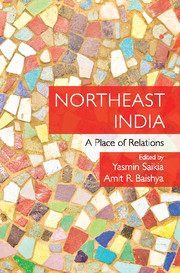Book contents
- Frontmatter
- Contents
- List of Figures
- List of Boxes
- List of Tables
- Acknowledgments
- Introduction
- Section I Contemporary Politics and Issues of Definition
- Section II Creating Presence
- 4 Bonnie Guest House: Fieldwork and Friendship across Borders
- 5 The Muslims of Assam: Present/Absent History
- 6 Ichthyonomics, or Fish and Humans in the Time of Floods: Rethinking Speciation in Assam
- Section III Knowing through Experience
- Section IV Rethinking Politics
- Glossary
- About the Contributors
- Index
4 - Bonnie Guest House: Fieldwork and Friendship across Borders
from Section II - Creating Presence
Published online by Cambridge University Press: 23 July 2017
- Frontmatter
- Contents
- List of Figures
- List of Boxes
- List of Tables
- Acknowledgments
- Introduction
- Section I Contemporary Politics and Issues of Definition
- Section II Creating Presence
- 4 Bonnie Guest House: Fieldwork and Friendship across Borders
- 5 The Muslims of Assam: Present/Absent History
- 6 Ichthyonomics, or Fish and Humans in the Time of Floods: Rethinking Speciation in Assam
- Section III Knowing through Experience
- Section IV Rethinking Politics
- Glossary
- About the Contributors
- Index
Summary
In anthropology, then, we go to study with people. And we hope to learn from them.
– Tim Ingold, 2013Age, fame, spectacular experiences and things out of the ordinary usually call for legitimate autobiographical introspection. None of these applies here. It is instead the present book project that gives me an excuse and an opportunity to recollect my journeys in the part of the world we know as Northeast India. For me, this is still an unfolding story, one that goes back almost twenty-five years in time. Anthropology and ethnographic fieldwork is the underlying frame for my entanglements with the region. This is critical. Other forms of travel and ways of knowing the world probably produce radically different engagements and experiences. The late Clifford Geertz asks, in his recollection of four decades of research in two provincial towns, the town of Pare in Indonesia and Sefrou in Morocco, how to make sense of change when everything is in flux: the two towns have changed drastically and so have the respective countries they are located in and eventually the world itself; the discipline of anthropology has also changed as has he, the observer, and pretty much everyone else. In such a situation, he writes, ‘there seems to be no place to stand so as to locate just what has altered and how’ (1995: 2).
Geertz's observation seems poignant for what I seek to do here. I am not after change per se, but would prefer to think about what prolonged fieldwork and investment in other places does to your anthropological sensibility and how you come to see and engage with the world. My contention is simple; as you bring experiences, connections and imaginings from the field back home, it spills over into your life more generally. Likewise, the attraction of a particular place or places relates to earlier predispositions, desires and aspirations. I will ponder about the significance of this in relation to my research and writings on Northeast India. Among the many people you meet and interact with during fieldwork, some become friends and what friendship might entail in the anthropological encounter is another issue I will grapple with in this essay.
- Type
- Chapter
- Information
- Northeast IndiaA Place of Relations, pp. 93 - 110Publisher: Cambridge University PressPrint publication year: 2017

